
Sharing snacks with your dog can be a heartwarming moment, but not all human treats are safe for pets. If you're curious about whether your dog can enjoy a marshmallow, this blog will explore the hazards marshmallows can pose to your dog’s health. Understanding what’s safe for your dog is important when choosing treats, so let’s take a closer look at marshmallows and discuss some healthier alternatives that will keep your dog both happy and healthy.
Marshmallows typically contain sugar, gelatin, and water, sometimes with added flavors. These ingredients can have negative effects on your dog’s health. Here’s why marshmallows aren’t the best choice for your pet:
Too Much Sugar
Marshmallows contain a lot of sugar, which can lead to weight gain, dental issues, and even conditions like diabetes in dogs. Unlike humans, dogs don’t handle sugary foods well, so it’s best to steer clear of giving them sweets like marshmallows.
The Xylitol Threat
Some marshmallows contain xylitol, an artificial sugar substitute that is harmless for humans, but extremely toxic to dogs. Xylitol can cause a dangerous drop in blood sugar, leading to symptoms such as vomiting, weakness, and even liver failure. If you think your dog has eaten a marshmallow containing xylitol, contact your veterinarian at Skyline Veterinary Clinic immediately.
While marshmallows without xylitol may not be as dangerous, they still aren't good for your dog. Here are a few reasons to avoid offering marshmallows:
Digestive Discomfort
The high sugar content in marshmallows can upset your dog’s stomach, leading to issues like vomiting or diarrhea. Even dogs with strong digestive systems might experience problems after eating these sugary snacks.
Choking Risk
Marshmallows have a sticky, soft texture that can be hard for dogs to chew and swallow, especially larger marshmallows. For small dogs, this can create a choking risk. Try to be mindful of the size and texture of the foods your dog eats.
If your dog manages to sneak a marshmallow, there’s no need to panic. Here's what to do depending on the situation:
Keep An Eye Your Dog
If the marshmallow didn’t contain xylitol, observe your dog for any signs of digestive issues, such as diarrhea or vomiting. If these symptoms occur, reach out to Skyline Veterinary Clinic at 402-933-6800 to discuss the best next steps.
Act Quickly if Xylitol Was Ingested
If the marshmallow contains xylitol, you’ll need to contact your veterinarian immediately. Xylitol can be dangerous for dogs even in small amounts, so call your veterinarian or a pet poison hotline as soon as possible for guidance.
While marshmallows aren’t suitable for dogs, there are plenty of healthier and safer options you can give your pet instead. Here are a few treats that won’t pose the same risks:
To avoid any accidental snacking, it’s a good idea to take precautions. Here are some ways to keep your dog safe from harmful foods like marshmallows:
Store Food Out of Reach
Keep marshmallows and other sugary or unsafe snacks stored in cabinets or containers that your dog can’t access. By removing the temptation, you lower the chance of your dog getting into something they shouldn’t.
Train Your Dog
Teaching your dog not to beg for food can help prevent them from consuming harmful snacks. Positive reinforcement training can encourage your dog to remain calm and stay away from the table during mealtimes.
Offer a Safe Snack or Toy
If you're enjoying a treat that’s not safe for dogs, give your pet something dog-friendly, like a healthy treat or chew toy, to keep them occupied. This will distract them and reduce the likelihood of them trying to grab something off your plate.
If your dog eats marshmallows or you’re unsure about a certain food they’ve consumed, it’s always wise to consult your veterinarian. Although marshmallows aren’t always dangerously toxic, they aren’t a good choice for dogs. There are plenty of other options to treat your dog and safely satisfy their cravings. For more advice on your dog’s diet or if you suspect they’ve eaten something harmful, call Skyline Veterinary Clinic at (402) 933-6800 to schedule an appointment.


